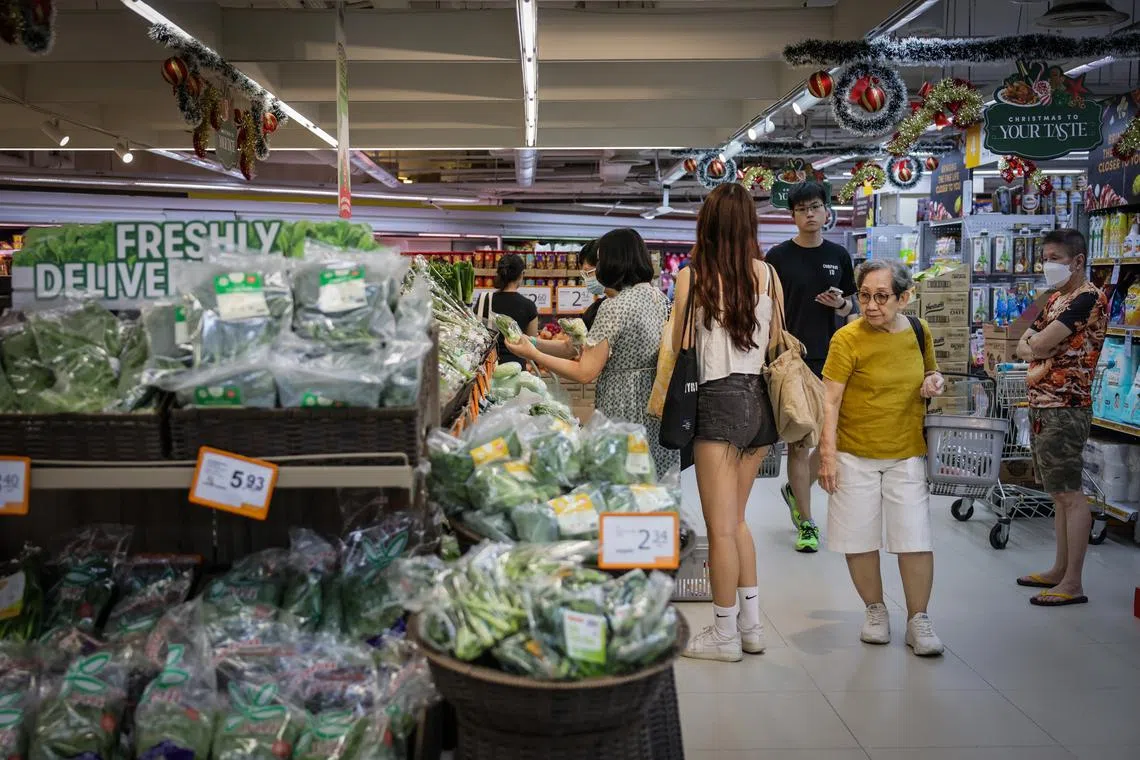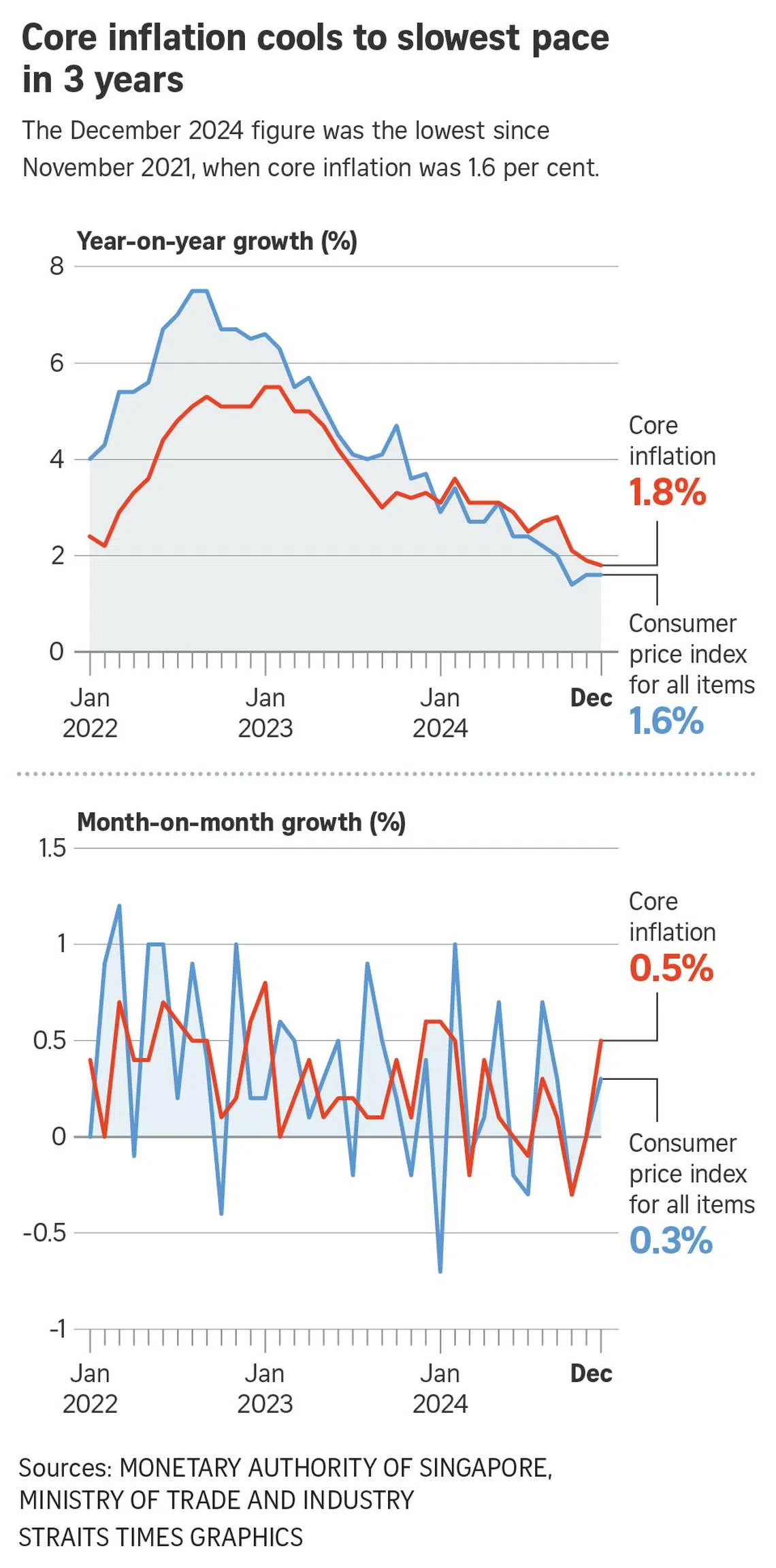Singapore core inflation drops further to 1.8% in December
Sign up now: Get ST's newsletters delivered to your inbox

Core inflation eased to 1.8 per cent year on year, from 1.9 per cent in November 2024.
ST PHOTO: GIN TAY
SINGAPORE – Singapore’s core inflation extended its decline in December 2024 as the cost of services moderated, though the gauge came in above analysts’ expectations.
Core inflation, which strips out private transport and accommodation costs to better reflect household expenses, eased to 1.8 per cent year on year, from 1.9 per cent in November 2024.
This is above the 1.7 per cent forecast by economists in a Bloomberg poll. It is still the lowest since November 2021 when core inflation was 1.6 per cent.
Overall – or headline – inflation was 1.6 per cent year on year in December, unchanged from November but higher than the Bloomberg poll of 1.5 per cent. It came as lower core and accommodation inflation was offset by a milder decline in private transport costs.
On a month-on-month basis, which shows the momentum in prices, core inflation increased by 0.5 per cent, while headline inflation rose by 0.3 per cent.
For 2024 as a whole, core inflation averaged 2.7 per cent, down from 4.2 per cent in 2023, the Monetary Authority of Singapore (MAS) and Ministry of Trade and Industry (MTI) said in their joint report on Jan 23. Overall inflation averaged 2.4 per cent, halved from 4.8 per cent the previous year.
MAS and MTI added that inflation forecasts for 2025 will be updated in MAS’ monetary policy statement due on Jan 24.
DBS economist Chua Han Teng said the bank expects a downward revision of the current official inflation forecast for 2025, which is 1.5 per cent to 2.5 per cent.
“We expect core inflation to stay below 2 per cent in 2025, and have also recently revised our average forecast to 1.5 per cent for 2025,” said Mr Chua. “Factors pushing core inflation down compared with 2024 include the fading impact of goods and services tax (GST) hikes, contained imported inflation, and reduced domestic business cost pass-through to consumer prices.”
Ms Selena Ling, chief economist at OCBC Bank, said “core inflation should continue to stay contained around the 2 per cent year-on-year handle” for the rest of 2025. She estimated that GST hike effects will start to fade from January 2025.
With inflation having fallen substantially in 2024, 11 of 17 economists surveyed by Bloomberg predict that MAS will ease its policy settings to give room for the Singapore dollar to weaken. But others reckon MAS will keep policy tight in case global inflation reignites when US President Donald Trump imposes fresh tariffs.
For December 2024, food inflation edged up to 2.5 per cent, from 2.4 per cent a month ago, as there was a larger rise in non-cooked food prices. Services inflation slid to 1.8 per cent, from 2.2 per cent a month ago, as holiday expenses dropped and public transport costs increased at a slower pace.

Accommodation inflation eased to 2.2 per cent year on year, from 2.4 per cent in November, due to a smaller rise in housing rents.
Private transport inflation fell at a slower pace of 0.1 per cent year on year, from a quicker pace of 0.7 per cent in November, due to a smaller decrease in car prices.
“The December inflation data may reflect a slight month-on-month strengthening in the public transport component owing to the recent 6 per cent increase in bus and train fares on Dec 28, 2024, although the full impact will likely only be observed in the January 2025 CPI (consumer price index) reading (released in February),” said Mr Jester Koh, associate economist at UOB, ahead of the report’s release.
Electricity and gas inflation stayed unchanged at 2.5 per cent, while inflation for retail and other goods rose to 0.3 per cent due to a smaller decrease in the prices of personal effects and a larger increase in the prices of medicine and health products.
Sheila Chiang is a business correspondent at The Straits Times.


